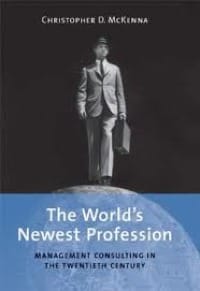Past Book Review (January 10, 2009): "The World's Newest Profession"
Past book review (i.e. posted prior to starting this blog) for The World's Newest Profession: Management Consulting in the Twentieth Century, by Christopher D. McKenna, Cambridge University Press, 2006:


A discussion of the consulting industry from its early origins in the late 1800s is what makes this book unique. The commentary that McKenna offers is superb. And some readers may be interested in the substantial end notes provided for this history, something rarely seen in books of this genre. While management consulting is the focus, a limited discussion of technology consulting is also provided.
The subject of this book is the answer to the question of "just how had the leading management consulting firms come to achieve such a dominant economic and cultural position?" As McKenna explains, "the historical explanation for the dominance of management consulting, as it turns out, was not to be found in the pragmatic choices of university graduates, but in a set of regulatory changes in America during the 1930s, the 1950s, and the 1980s that were bolstered by the strategic development of new markets by the leading management consulting firms."
"American antitrust regulation shielded early consultants from competition from rival professionals even as entrepreneurial firms created new lucrative practices by concentrating on particular market segments[.]" In fact, "this regulatory history helps to explain why most of the leading management consulting firms in the world are American in contrast to the other business professions, like law or accounting, where state regulation did not favor one geographic market over another."
"Remarkably, the regulatory history returned to haunt management consulting firms at the end of the twentieth century because corporate board members had come to rely so heavily on professionals to reduce their corporate liability. Throughout the twentieth century, state regulation, as much as international innovation, first shaped and then reshaped the evolutionary path of management consulting."
Very timely reading, especially in light of the recent (January 2009) revelation that PricewaterhouseCoopers was the auditor of Satyam Computer's doctored accounts. McKenna discusses the seemingly similar (and familiar) case associated with Arthur Andersen and Enron, but not until the ninth chapter, and this is not the focus of the book (there have been other texts solely focused on the Enron case if that is what interests the reader).
This book provides remarkable insight into the consulting industry, and is recommended reading for all consultants, those who are considering consulting as a profession, and all business professionals seeking better understanding of the consulting industry.